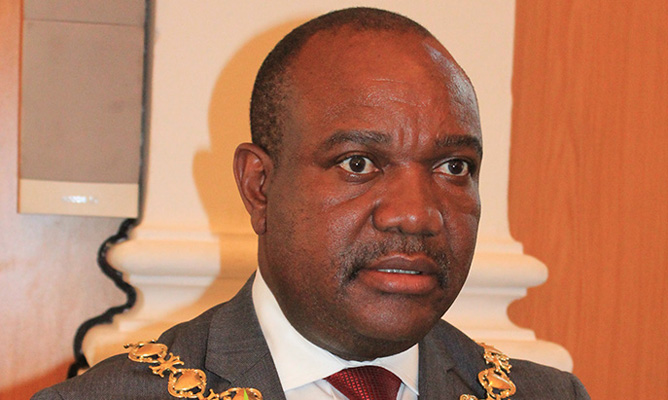
HARARE mayor Bernard Manyenyeni has asked city directors to table new salary structures, as the local authority moves to align its wages with service delivery and revenue collection.
BY XOLISANI NCUBE
Manyenyeni yesterday said he had asked top management to make proposals of how much they would want to earn against the workload at Town House.
“This is the first exercise, which for long, has been avoided. I have asked them to come up with proposals and from there, we have to sit and discuss so that we come to a position, which is tenable to both the workers and service delivery,” he said.
Council has been accused of spending at least $10 million on salaries, with city employees said to be earning more than their counterparts in government or the private sector.
Manyenyeni has been at loggerheads with fellow councillors on the need to rationalise wages in line with what industry is offering.
According to the city’s salary schedule, a farm guard earns more than a police inspector, teacher, nurse or even a junior doctor at a government hospital.
This has been despite that Harare’s revenue streams have plummeted over the years, with residents battling to access water and other essential services, while its wage bill gobbles 70% of revenue.
- Chamisa under fire over US$120K donation
- Mavhunga puts DeMbare into Chibuku quarterfinals
- Pension funds bet on Cabora Bassa oilfields
- Councils defy govt fire tender directive
Keep Reading
In the past weeks, Harare was been accused of pumping dirty or untreated water, exposing residents to diseases such as cholera and typhoid.
Manyenyeni said he had also called for an emergency meeting with councillors to deal with burning issues, particularly water shortage, high labour costs and corruption at Town House.
The salary schedule shows that the city has 7 041 permanent workers and 259 contract workers, with a guard stationed at any of its farms taking a gross monthly income of $902 inclusive of housing allowance, transport allowance and funeral cover among other benefits.
A street cleaner, who is in grade 15, earns a gross salary of $520 — a figure that is way above what police constables, prison guards and even teachers earn.
According to the schedule, the highest paid council worker is the town clerk, who is in grade one and has a basic salary of $10 475,75 and other benefits which include fuel, car, medical aid and pension, bringing the total to $12 300.
A town clerk, director, deputy director and a line manager are entitled to retention allowances and cars, among other benefits.
In 2014, Harare was named in what became known as the Salarygate Scandal that rocked Zimbabwe when then town clerk, Tendai Mahachi was reportedly pocketing around $37 000.
In the private sector, a legal practitioner gets a basic salary of between $600 and $900 and plus commission depending on the number of clients one brings.
According to lawyers, generally, most of them get a gross salary of $1 200, but Harare’s legal officer gets a gross basic salary of $2 670, while the city’s chief legal officer gets gross pay of $3 990.











